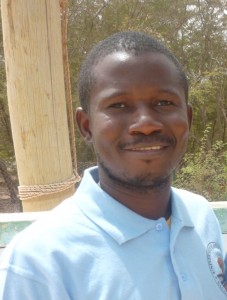We are delighted to welcome Issiaka Ballo to what is now a 5-member translation team based in Bamako. Issiaka has assumed the role of “medical editor,” working closely with Malian health professionals to verify, adapt, and update the source text to fit the West African context. Below are his bio and some of his thoughts on why this is an important project. Please join us in welcoming Issiaka to the Dokotoro team!
Issiaka Ballo has a bachelor’s degree in English from the University of Bamako (2006), and a Master’s degree in linguistics (2012) from the Université Gaston Berger de Saint Louis, Sénégal. During college in 2005, he met Mamadu Dukure, a famous activist working on national language promotion, sparking his life-long interest in promoting Mali’s languages. Issiaka helped him to create the first mono-lingual electronic dictionary of Bambara (2005–2007). He also began teaching classes in Bambara transcription to university students as a volunteer. Today, he continues to teach Bambara courses as an adjunct faculty member.
For the last several years, Issiaka has been in demand among NGOs for his trilingual (English-French-Bambara) oral interpretation and written translation services, including with the American NGO Medicine for Mali. Since 2010, he has been the language coordinator for MAKDAS (Mali Kanko ni Danbe Se – Mali language and culture promotion), a company which creates software and websites in multiple African languages.
Since 2002, Mr. Ballo’s interest in the Bambara language has led him to undertake his own independent research, and he has transcribed seven epic tales that had, until now, never been written. His other research interests are Malian proverbs and family names, Bambara vocabulary, grammar, and rhetoric, and the creation of words and terminology for new concepts.
When asked why he thinks it is important to translate Where There Is no Doctor into Bambara, Issiaka offered the following thoughts, which are presented below in Bambara, followed by an English translation.
Kabini ne y’a mɛn ko Where There is No Doctor bayɛlɛmani n’a bɛrɛbɛnni Mali tabiya ma bɛ sen na Bamanankanna, o ye ne sewa kosɛbɛ. Ne dɔnfɛn ye gafe in ye. A kɔnɔdɔnniya ye dɛmɛnanba ye furakɛli ani forobakɛnɛya hukumu kɔnɔ. A yɔrɔ min ye ne diya ka tɛmɛ o ye muso tintɔ min den ye dalen ye dɛmɛyɔrɔ ye k’o lajigin.
Ni gafe Bamanankanna ma bɔra tuma o tuma “Dɔgɔɔtɔrɔ tɛ yɔrɔ min na,” Bamanankan siginikalandenw na wasa sɔrɔ a la kosɛbɛ. U na bɔ forobakɛnɛya faamuya dugumadakunw kala ma. O bɛ wolo banaw kunbɛnni fɛɛrɛ sɔrɔli la, o min bɛ bange dɔ bɔli la saya la sigida la.
When I heard that the translation into Bambara of the book Where There is no Doctor and its adaptation for Malian culture had begun, I was delighted. I have known about this book for some time. It is a very useful guide to basic medical practices and public health. The section which I appreciate the most is where a breech delivery is demonstrated.
Whenever the Bambara version of the book “Dɔgɔtɔrɔ tɛ yɔrɔ min na” becomes available, it will benefit anyone who is literate. Readers will discover the basic concepts of public health. This will help prevent the spread of disease, which will mean better health and fewer unnecessary deaths in the community.

